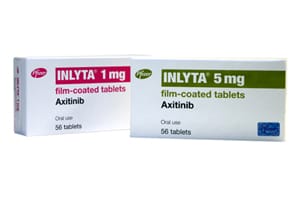 The UK’s National Institute for Health and Clinical Excellence (NICE) has not recommended Pfizer’s kidney cancer drug Inlyta in preliminary guidance.
The UK’s National Institute for Health and Clinical Excellence (NICE) has not recommended Pfizer’s kidney cancer drug Inlyta in preliminary guidance.
The draft ruling, which will now be open to consultation, does not back Inlyta (axitinib) to treat advanced renal cell carcinoma after the failure of prior treatment with Pfizer’s own Sutent (sunitinib) or a cytokine.
The drug was approved in Europe in September and is one of the products Pfizer is counting on to take the strain now that its blockbuster Lipitor faces generic competition.
Pfizer said it was disappointed with the preliminary guidance, noting that NICE does not currently recommend any targeted therapies for advanced kidney cancer following failure of first-line therapy.
Its head of UK oncology Ben Osborn said: “We believe that, in this disease area where there is still a high level of unmet need, axitinib represents good value to the NHS. To this end, we are committed to working through the NICE consultation process to address the uncertainties within this preliminary recommendation.”
Issuing its Inlyta guidance, which comes despite Pfizer proposing a patient access scheme, NICE criticised the data the pharma company gave to its appraisal committee.
NICE chief executive Sir Andrew Dillon said: “The trial data provided by the manufacturer of axitinib included a direct comparison of the drug to sofafenib [Bayer’s Nexavar], a drug not recommended by NICE and not identified in the scope.
“The trial also lacked a comparison to ‘best supportive care’, which is what the majority of patients receive at the moment; therefore an ‘indirect’ and ‘simulated’ comparison was made using separate data from another trial.
“When the Committee considered this comparison, they noted that limited analysis was undertaken to identify uncertainties within this simulated method of comparison and therefore they were concerned about its validity and reliability.”
Inlyta did meet NICE’s ‘end-of-life’ criteria, allowing for a QALY of up to £50,000 rather than the usual £30,000, with sufficient evidence to indicate that the treatment offers an extension to life of at least an additional three months in the case of the prior-Sutent population, compared with current NHS treatment which is best supportive care.
However, in the case of the prior-cytokine group the Committee considered that these were people who could receive Sutent or GSK’s Votrient (pazopanib), both of which NICE recommends, but said no comparison had been available.
Nevertheless, NICE’s appraisal committee judged Inlyta’s cost per QALY for the group that had received and failed on Sutent to be approximately £62,000, but said that even this figure was uncertain.
Dillon said that, in addition to contributing to the consultation process, Pfizer would also be able to submit a further patient access scheme to the Department of Health if they wanted to.




